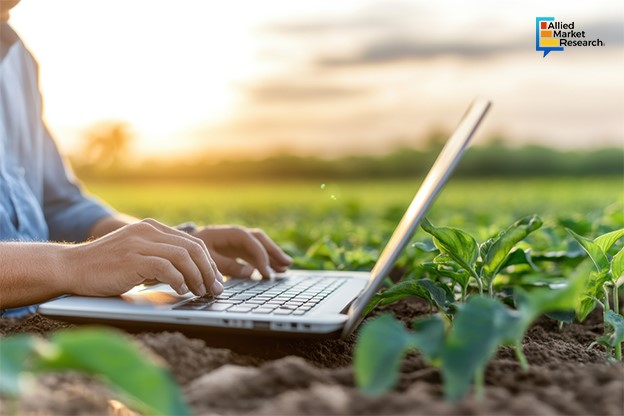How Advances in Agritech Transform Farming Practices with Enhanced Sustainability

12 May
2025
Highlights:
- An introduction to agritech
- AI and IoT in transforming farming practices
- Robotics and drones opening new possibilities in agriculture
- Key initiatives taken by industry players
Agritech, also known as agtech, or digital agriculture, refers to the integration of technology and digital tools into farming practices. This field includes a diverse array of innovations, including automation, biotechnology, data monitoring, and analytics, transforming how food is produced and managed. This advanced farming method enables farmers to boost efficiency, increase yields, cut costs, and enhance sustainability.
In the last few years, this agricultural practice has gained huge popularity, driven by rising global food demand and the urgent challenges posed by climate change, which threaten food security worldwide. Though agri-tech is most commonly applied in horticulture and traditional agriculture, nowadays, its impact extends to forestry, aquaculture, and viticulture, supporting sectors in timber production, fish farming, and winemaking.
AI and IoT leading the Agritech wave
The rise of modern technologies such as AI and IoT has played a key role in transforming smart farming by enabling data-driven precision and efficiency. AI-powered systems analyze vast datasets from satellite imagery, weather forecasts, and ground sensors to deliver actionable insights. For example, platforms like Farmonaut’s Jeevn AI predict pest outbreaks, recommend irrigation schedules, and optimize fertilization by integrating real-time soil moisture, crop health, and weather data. Predictive analytics also forecast yields, helping farmers mitigate risks and allocate resources effectively. In addition, advanced machine learning models detect plant stress and diseases early using drone-captured multispectral imagery, allowing targeted interventions that reduce crop losses. These tools empower farmers to maximize yields while minimizing water, chemical, and energy waste, aligning productivity with sustainability.
On the other hand, IoT networks provide real-time field monitoring through soil moisture sensors, weather stations, and automated greenhouse controls. IoT-powered devices track variables such as temperature, humidity, and nutrient levels, enabling precise irrigation and fertilization. In London, Farmonaut’s IoT solutions reduced water usage by 30% through soil moisture-based irrigation alerts. Connected drones and autonomous equipment further enhance efficiency-smart greenhouses auto-adjust climate settings, while GPS-guided sprayers apply inputs only where needed. According to a recent study, these modern systems are projected to cover over 1 million acres of farmlands globally in coming years, devastating operational costs and environmental impact.
Robotics and drones driving agritech innovations
The agritech industry has witnessed prominent growth in the last couple of years due to the rapid advancements in robotics and drone technology. Modern robots and drones are transforming agriculture by automating labor-intensive tasks and enabling precision in field management. Drones equipped with multispectral cameras monitor crop health, detect pest infestations, and apply pesticides or fertilizers with remarkable accuracy. Innovations such as drone swarms allow for rapid, coordinated surveillance and interventions across large areas, ensuring timely responses to emerging threats and optimizing resource use.
Moreover, autonomous tractors and robotic harvesters-often called agribots-are revolutionizing traditional farming operations. These machines plant weed and harvest crops with minimal human intervention, operating continuously to maximize productivity and address labor shortages. Robotic systems utilize advanced sensors, GPS, and AI to enhance precision in tasks like sowing, fertilizing, and harvesting, reducing waste and environmental impact while increasing yields. These technologies support data-driven decision-making and adaptability to changing conditions by collecting real-time data on soil, crops, and weather, thereby improving efficiency, sustainability, and profitability in modern agriculture.
Innoterra and Fasal united to strengthen Farmlink operations
In March 2025, Innoterra, a Swiss-Indian agritech platform announced its acquisition of the food distribution business of Fasal, the pioneer of precision farming. This acquisition enables Innoterra’s B2B ecommerce platform Farmlink to boost the supply chain and expand its distribution footprint across the nation. Under this agreement, Innoterra is expected to utilize Fasal’s network of 85,000 horticulture farmers, spanning clusters such as grapes, pomegranates, apples, guavas, and bananas. In addition, this initiative has helped the company to diversify into the non-perishable goods segment such as rice and spices and enhance its top line and customer base.
Final words
The rapid evolution of agritech is driving a more resilient, efficient, and sustainable global food system. Advanced technologies like AI, IoT, robotics, and drones have transformed various agricultural practices by increasing productivity, enhancing precision, and driving sustainability. With the rising global food demands and emerging climate challenges, agritech offers a scalable, data-driven approach to ensure food security, reduce environmental impact, and create a resilient agricultural future.
For more insights into the latest technological advancements in the agritech industry, feel free to talk to our esteemed analysts today!

Rosy Behera
Author's Bio- Rosy Behera holds a bachelor’s degree in Electrical and Electronics Engineering and now she is a content writer by profession. She loves to portray her thoughts and ideas with a nice command of words. Grabbing an audience with her creative write-ups is one of her biggest assets so far. Apart from writing, she is a certified “Odisi” dancer and has done Gardharva in Drawing, Painting, and Arts. She always explores new things through travel and is a big foodie.
Avenue: Entire Library membership of Allied Market Research Reports at your disposal
- Avenue is an innovative subscription-based online report database.
- Avail an online access to the entire library of syndicated reports on more than 2,000 niche industries and company profiles on more than 12,000 firms across 11 domains.
- A cost-effective model tailored for entrepreneurs, investors, and students & researchers at universities.
- Request customizations, suggest new reports, and avail analyst support as per your requirements.
- Get an access to the library of reports at any time from any device and anywhere.
Related Post
-
How are Submarine Cables Transforming Global Connectivity with Enhanced User Experience?
-
Endoscopy Procedures: Transformations in Techniques and Applications
-
AI-Powered Video Analytics: How the Product Actually Works for enterprises
-
Painting Robots: Transforming Precision Coating and Creative Applications
-
Innovations in Pharmacovigilance Systems Advancing Patient Safety
-
Understanding Edge Security: Keeping Data Safe Near the Source
-
Exploring the Use and Advancements of 3D Laser Scanners in Professional Applications
-
Reinforcing Industrial Controls with Smarter Tools and Training








